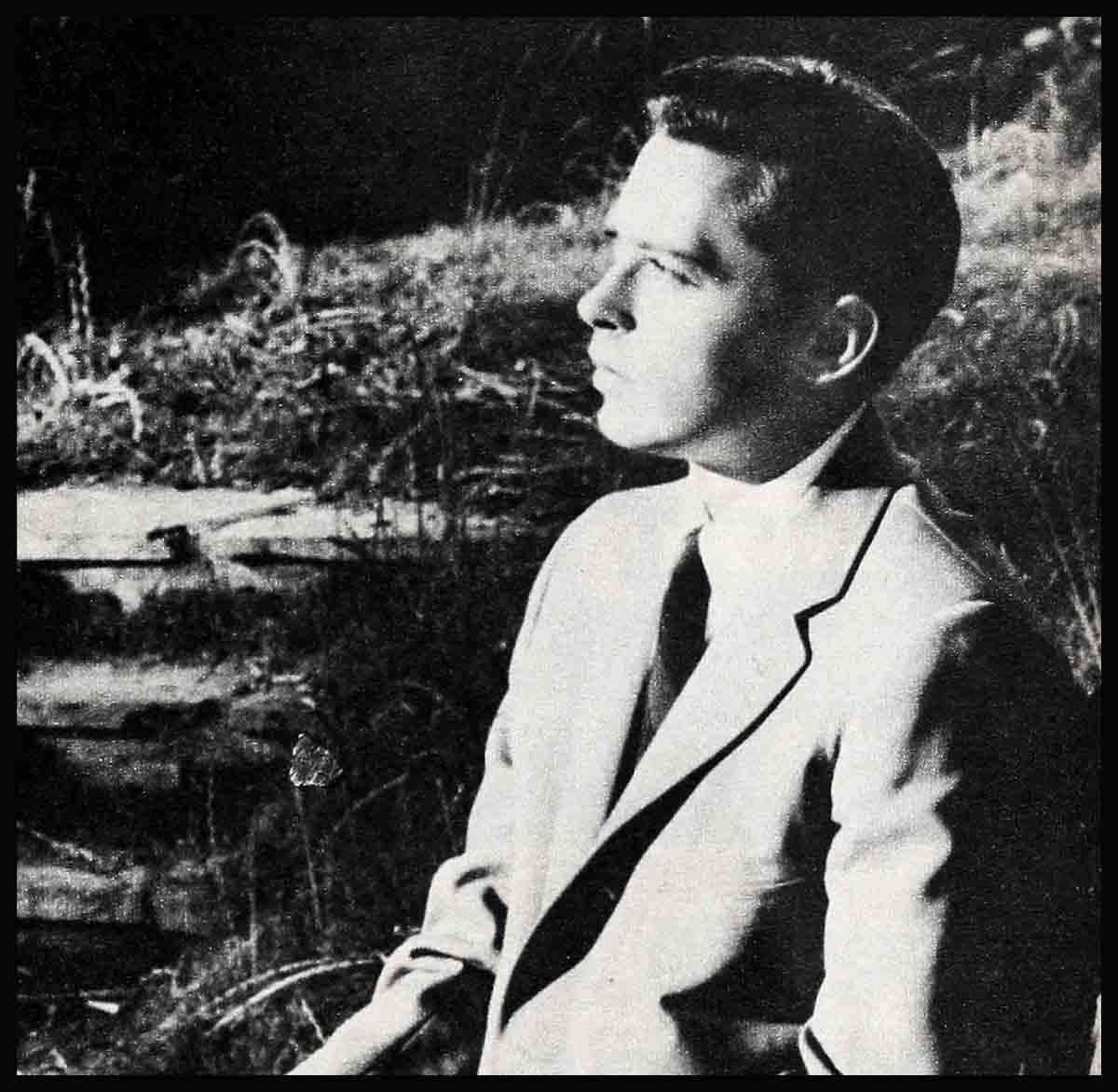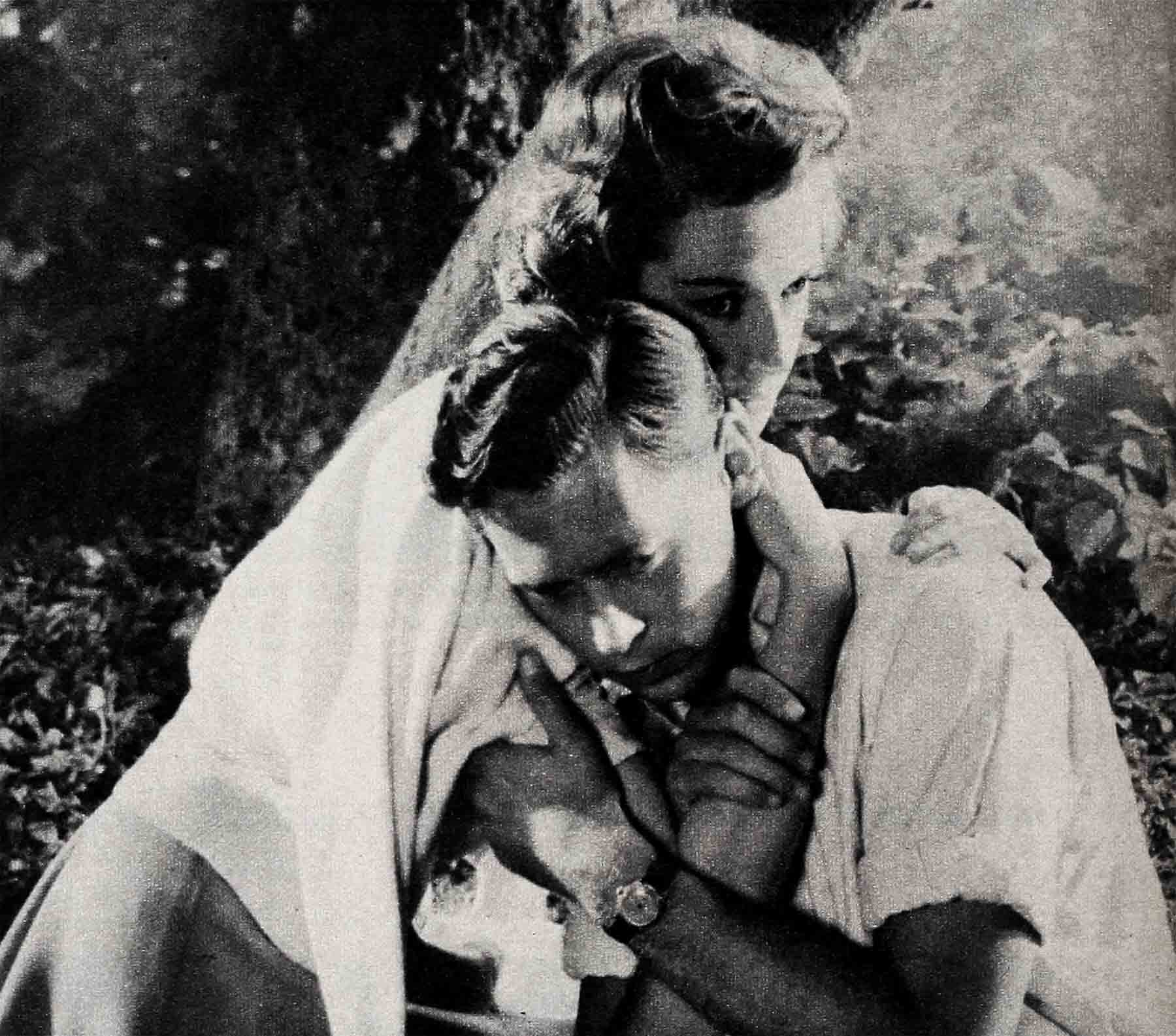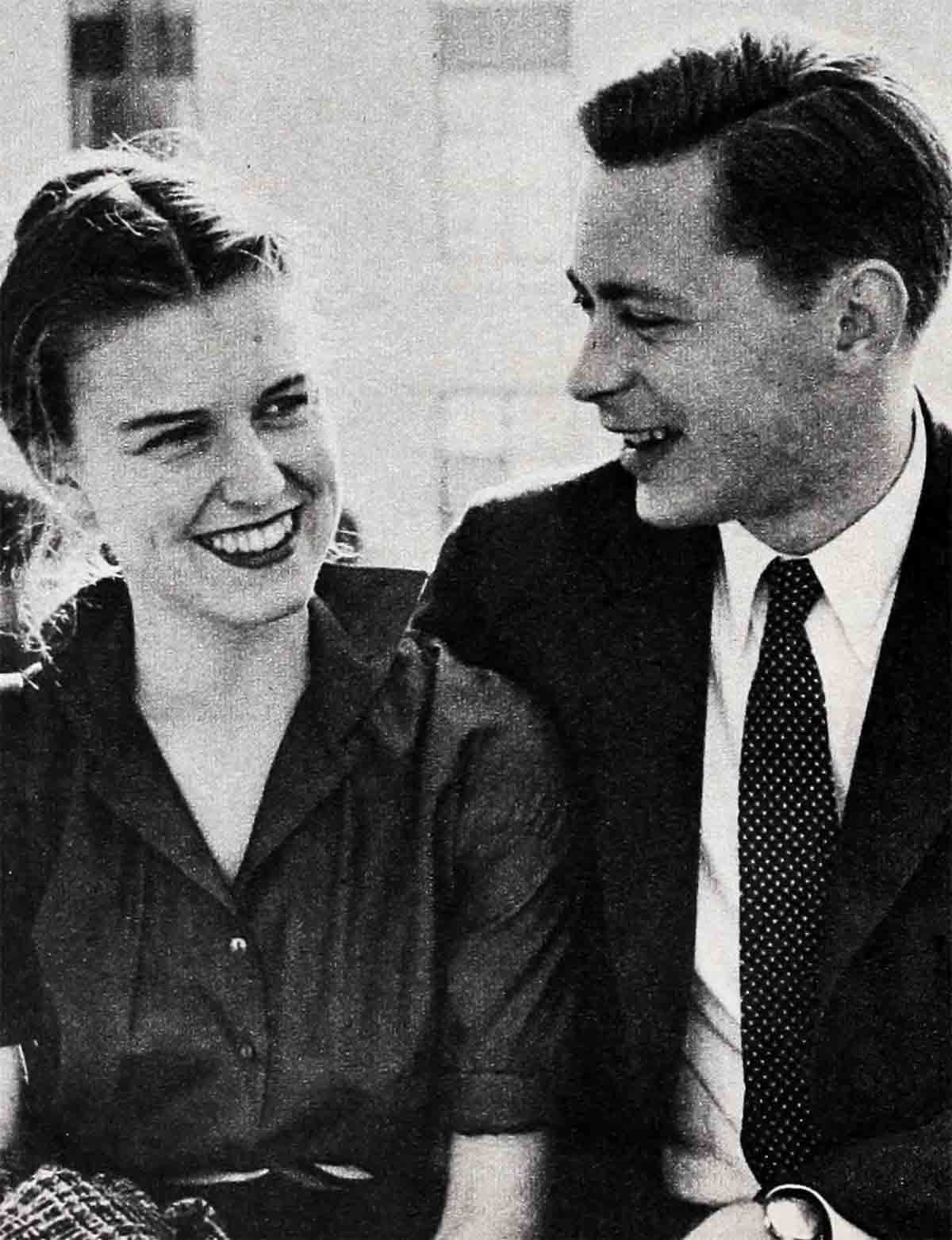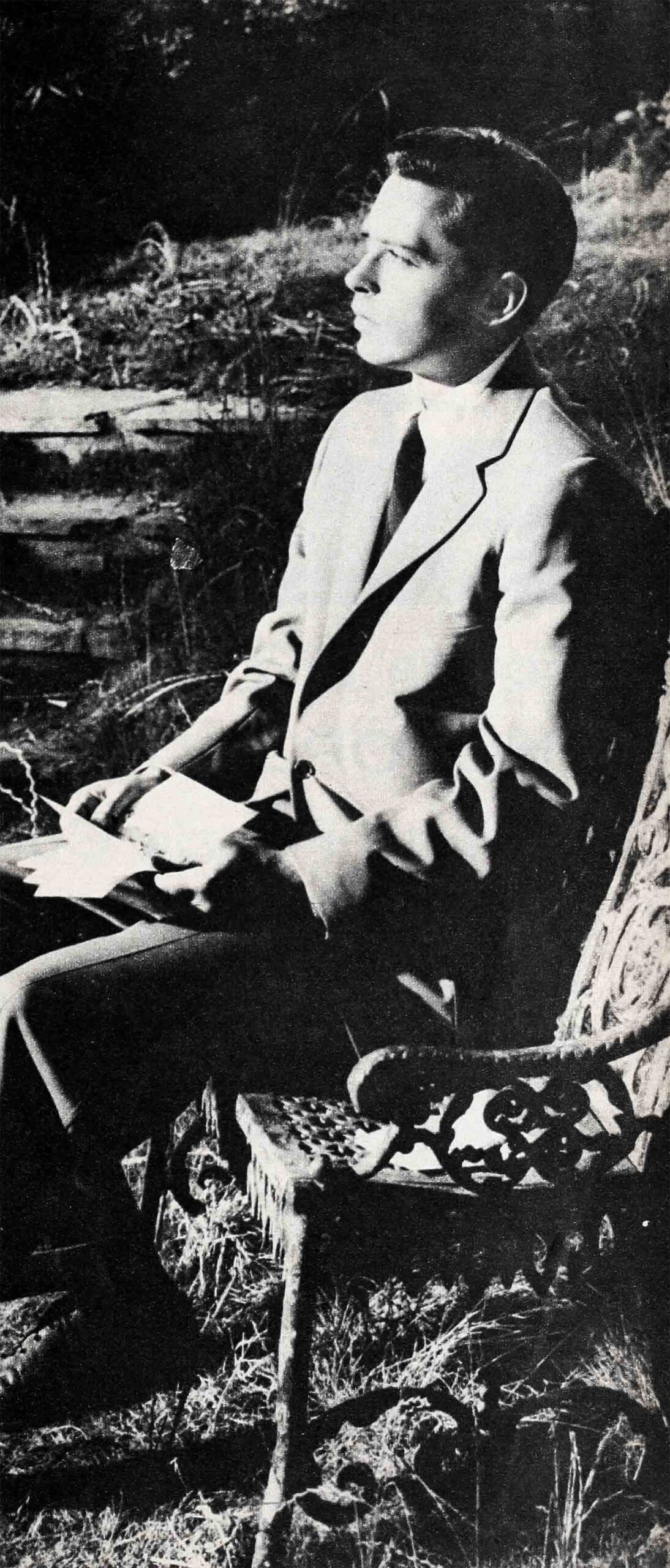
The Searching Years—John Kerr
Afraid?
“Scared stiff is a better description,” John Kerr corrected. “When I stop to think how far I’ve gone and how fast, I’m petrified!”
We were talking at the bar of the Hotel Aioli in the little French town, St. Tropez, where John, Pier Angeli and Mel Ferrer had arrived last summer to film “Harvest Thunder.” John ordered another Compari-and-soda and sipped it slowly. “Yes, it’s frightening,” he repeated. And when he looks at you with those large, sorrowful eyes, you know he is frightened.
“I try not to think about it,” he explained. “When you think, you worry. You wonder where it’s all leading, how soon the bubble will burst. Thinking too much is my worst fault.”
Going to a table to order dinner, John walked cautiously, as though he were uncertain of the very boards he tread. He phrased his sentences carefully, as he continued the conversation, weighing each word. He’s constantly searching for a cigarette, constantly glancing about, constantly moving. It’s all part of a deep-rooted sense of his inability to understand what is happening today in terms of his past.
“Five years ago, I was still a student at Harvard,” he said. “I thought I wanted to be a doctor, then I switched to studying literature and finally wound up majoring in the Russian language.” Those were the days when John Kerr had no idea which profession he would follow or where he would find peace and happiness. Painfully shy, sensitive, he was groping for something. He didn’t know what.
Suddenly the fates tossed him into an acting career. He had three Broadway plays, “Bernardine,” “Tea and Sympathy,” and “All Summer Long,” in quick succession. Then three movies, “The Cobweb,” “Gaby,” and “Tea and Sympathy.” And now, “Harvest Thunder.” But acting was the last thing he’d thought about back in college.
Born in New York City twenty-five years ago, John is the only son of actress June Walker and actor-playwright Geoffrey Kerr. “Our apartment was constantly filled with professionals, who talked of nothing but the theatre, movies and radio,” John recalled. “I didn’t understand them, so I ignored them. I retreated to my room to read a book.”

Early in life, John says, he became withdrawn and pensive. And alone. He was a little boy living in an adult world, For companionship, he sought out the heroes in the pages of famous novels. When he was ten, the situation grew blacker. His parents were divorced. His father returned to his native England and June Walker brought up her son the best way she could.
John interrupted this description of his childhood, turned to a waiter and ordered our dinners in perfect French. He’d studied at Harvard, he explained briefly. Then he went back to his story.
“It wasn’t easy for Mother or me,” he said. “Mother had to work to support me. She was always either busy in a Broadway play or on the road with a show. I spent a lot of time in boarding schools.”
An intelligent, impressionable boy like John needed security in those years—needed it desperately. But it wasn’t to be found. When Easter and Christmas holidays rolled around, other youngsters gleefully packed up and journeyed home. Not John. He remained at boarding school. His mother was on tour, his father in England. There was no home for him.
That’s when John began to think—and to think too deeply. Why was he always by himself? What was going to happen to him in this strange, lonely world? Where was the happiness other kids knew? Where was he going?
Perhaps it was because he had been hurt a good deal in his young life that John decided he’d like to help others. When he enrolled at Harvard, he registered for a pre-med course.
“I stuck it out a few months,” John reminisced, with his first faint smile. He seldom smiles, almost never laughs. “Then,” he continued, “I realized I didn’t know enough physics and chemistry, so I transferred to literature. That was much easier. The next year, I decided I ought to shape myself for some sort of profession. A diplomatic career sounded intriguing, so I began studying French and Russian.”
John went on to talk about his life. According to him, the first bright note was sounded as a result of his interest in Slavic languages. In the fall of 1951, he had enrolled in a course in Serbo-Croatian. Sitting in the classroom near by was a slender, pretty brunette from Radcliffe. When John looked at her, he felt a flurry of butterflies in his stomach. He remembers saying to himself. “I’m going to marry this girl. And I don’t even know her name!”
In his bashful way, it took John two weeks to work up enough courage even to say hello. He learned from roll call that the coed’s name was Priscilla Smith. After a month of shy “hellos,” he finally invited Priscilla to the movies.
“I thought he’d never ask me!” Priscilla has since confided. “I’d been harboring an awful crush and was dying for a date. I guess it was that rare thing—love at first sight.”

From the first date on, John and Priscilla had no doubt that someday, somehow, they would be married. “I still hadn’t made up my mind about a career,” said John. “You can’t get married without a job.”
Inevitably, the theatre beckoned. In 1946, June Walker had been engaged to appear in summer stock at the famous Cape Playhouse in Dennis, Massachusetts. “Johnny,” she said, “we’re together so little. Why don’t you come up with me? I’ll get you a job as an apprentice.”
Agreeably, Johnny went. Being an apprentice meant wearing dungarees, hauling props, painting backdrops “and cleaning up the johns,” Kerr recalled. He received room and board in exchange for his services. In spare moments, he could catch a dip in the surf. Afternoons, he could be with his mother.
John tagged along to the Cape the next two summers. In 1948 something happened. Something mighty important. A member of the cast suddenly got a Broadway engagement, packed up and left. The director needed an actor in a hurry. It was a small part. He approached John. “Can you do it?” There was no time for John to think about a decision. If there had been, he probably would have said no. “Okay, I’ll try,” he replied.
Kerr’s first performance was so good that he was asked to appear again. This time with Gertrude Lawrence in “O Mistress Mine.” Once more, he acted with unusual ability.
“But after the Cape season,” said John, “I started at Harvard and almost forgot about the theatre. I never really wanted to act. I’d been too close to the theatre and had seen too much suffering in it. Somehow I drifted into college dramatics. In my senior year, I appeared at Harvard’s Brattle Theatre in ‘Billy Budd.”
One night after “Billy Budd,” the famed producer, Guthrie McClintic, wandered into the young man’s dressing room.
“Kerr,” he said, “I liked your performance. If you’re in New York, come and see me.”
This was a shock to John. “I still hadn’t figured on acting for a living,” he declared, lighting a cigarette. “I didn’t know if McClintic actually meant it. You see, I’d heard a lot of big talk and promises that never materialized in the acting game. I wondered if Id get to New York and McClintic would say, ‘Who? Kerr? Never heard of him!”
John described how he decided to take a chance. For one thing, there was Priscilla. He had to get a job if he wanted to marry her. Therefore, with Priscilla more than the theatre on his mind, he ventured to New York and phoned McClintic. Surprisingly to John, McClintic remembered him and asked, “Can you come over tomorrow at ten?”
When John arrived in McClintic’s office, he was tossed a script and told, “Read for me.” John read. The producer listened.

“All right.” said McClintic. “Show up for a cast reading next Tuesday. Take the script home. It’s a new play called ‘Bernardine.’ ”
John walked out of the office as though he were treading on thin ice. Could this be it? Was he really going to be hired for Broadway—just a few weeks out of college? He kept shaking his head. No, this couldn’t be John Kerr. Something this good couldn’t be happening to him! Tormented with worry and fears, John returned to his mother’s apartment, where he was living. June Walker, well schooled in the heartaches and pitfalls of the theatre, didn’t have much to say.
“I don’t want to advise you, Johnny,” she explained. “In the theatre, everyone must stand alone and work out his own destiny. If I encourage you and you fail you may feel I’d given you false hope. If I don’t encourage you and you succeed, you might lose faith in me. But just know,” she added warmly, “that whatever happens, my love will go with you.”
For the next few days, John continued to fret and ponder the prospects of Broadway. Not openly, but deep inside himself. For such is his extraordinary self-control, he never betrays the emotions which are surging underneath. Finally, the morning before the first cast reading, he turned to his mother.
“How much do you think I should ask if they hire me?”
Wisely, his mother replied, “How much do you think you’re worth?”
John shrugged. “I’d like to get a hundred and fifty a week.”
“Then that’s your answer,” smiled June.
That first reading took place around a large table set on the bare stage of an empty Broadway theatre. Although he appeared calm enough, inwardly John was a bundle of nerves. Later in the afternoon, when the reading was over, the company manager struck up a conversation and walked John out to the street.
“Say,” said the manager, “we haven’t talked about salary.”
“No,” answered Kerr, mentally calculating that he’d come down to an even hundred if need be.
“How about two hundred and fifty a week?” asked the manager.
Kerr gulped. “Ye-ah, sure! That’ll be all right!”

The first thing John did, after saying a hurried goodbye to the manager, was rush to the nearest phone booth and call Priscilla at her home in Massachusetts. “We can be married . . . I’ve got a job . . . I can support you. . . . Two hundred and fifty a week!” he told her in one breath.
But John’s rose-colored dream almost exploded in thin air a few weeks later. After a period of reading around the table, McClintic was ready to stage the action. John followed directions carefully, striving to do the best he knew how. From time to time, he noticed whispered conferences in the wings. The producer, the writer, the stars apparently were talking about him. What was it all about? What was wrong? At last, he found out. There was a feud going on. One faction wanted Kerr in the play; another group thought he was too inexperienced. John’s heart sank. Just as he’d feared, it had all been too good to come true! Then suddenly, the pro-Kerr side won out. And nobody was sorry. Critics raved over his performance in “Bernardine” and called John Kerr “the most promising young male actor of the year.”
John smiled again, just slightly. “On December 28th, 1952, in Milton, Massachusetts,” he said softly, “Priscilla and I were married. We took up housekeeping in a small, antiquated walk-up in New York’s Greenwich Village.”
Priscilla settled down to providing John with a homelife he’d never really known. She washed his socks and shirts, sewed on missing buttons. She bought cookbooks and learned to whip up elegant dishes on a strict budget. As was inevitable, there was a period between “Bernardine” and John’s next play, “Tea and Sympathy,” when no paychecks were coming in.
Both enjoyed music and when they had money began collecting records, mostly classical. Priscilla, who plays the piano, discovered John had a fine singing voice, and she started inviting friends in for musical evenings. John loved these evenings. After a while, at Priscilla’s coaxing, he became brave enough to sing authentic old Russian folk songs for the crowd. Everyone was amazed. They didn’t know he could sing, let alone in Russian!
“Yes,” John admitted, “I can read, write and speak Russian fluently. So,” he added, with that typical apprehension, “if the bottom ever falls out of acting, I can always become a teacher.”
That’s John Kerr for you! Never sure—even now, with movie offers coming right and left. “I guess there’s no reason to worry so much,” he uttered thoughtfully. “It’s just a bad habit. Maybe I’ll change eventually. I’m trying.”
After a lengthy Broadway run in “Tea and Sympathy,” John appeared in “All Summer Long,” in which his mother starred. “It was a great experience, working with Mother,” he recalled. “I portrayed her son, and we had some good, powerful scenes together. But she never gave me any advice or criticism. She’d already taught me to stand on my own feet. That was the best advice I’ve ever had.”
John could have been in Hollywood a lot sooner. After his triumph in “Bernardine,” he received a rush of calls. “But I wanted the right kind of part,” he explained. “I waited. When ‘Cobweb’ came along, I knew that was for me.”
One thing about John, if you met him on the street, you’d never suspect he was an actor. Sure, he’s good-looking—six-feet tall, light-brown hair, steady blue eyes. But he dresses conservatively, mostly in browns and grays. He acts conservative, too. “You don’t have to lead an artificial life,’ he pointed out, “just because you’re an actor. In fact, if you’re really working hard, you can’t. There isn’t time.
“Take Hollywood,” he continued. “It’s not all cocktail parties. For the most part, it’s a real grind, a long, fatiguing day. Scenes are shot one after another. Everything is hurried. When you get home at night, you’re ready to put your feet up and rest.”
In that hurried Hollywood pace, John told me, he learned to play tennis, courtesy of M-G-M. His role in “Tea and Sympathy” called for this athletic feat. “Now, I’m crazy about the game. I try to get to the courts whenever I’m free.”
M-G-M also got John’s singing voice in trim for his number in the same movie. “It required quite a lot of takes,’ he confided, grinning modestly. Then he proudly added, “But when you hear the song, that’s really me!”
Hollywood presents one big problem to John. Studios are always miles from anywhere and John had to drive to work. “I hate to drive!” he stated. “Maybe I concentrate too much and think too much about all the other cars and the traffic and the lights. Who knows? All I know is that sometimes I get into my car in the morning and feel like getting right out again and staying home.”
But more important than all the minor irritations, John has a home—a real home of his own. He, Priscilla, their twin daughters, Jocelyn and Rebecca, born in May 1954, and a beagle named Joe had been commuting between New York and Hollywood. And John had been doing his usual deep thinking and worrying about the situation. Should they make their residence in the East or in the West?
“I love New York at night,” said John, as he lighted another cigarette. “All the plays, the concerts, the fine restaurants. On the other hand, I love the weather California offers in the day. I fretted about a year and finally worked it out mathematically. You have eight hours of day and three hours of night, not counting time out for meals. California won.”
This July, the Kerrs purchased a delightful, colonial-type home in Westwood Village. And the very first thing John bought for the house was a huge dark-red leather chair. “It’s my chair, and mine exclusively,’ he declared, with another slight flicker of a smile. “I’ve yearned for one all my life. If I’m home, that’s where you’ll find me, reading the paper or watching television.”
At this point, John interrupted to tell the waiter in careful French that he’d like some café au lait. Quite a discussion followed, for the French have milk in their coffee only in the morning, which this was not. Eventually, the waiter returned and, looking very offended, served the café au lait.
“It’s the closest I can get to American coffee,” John explained, dropping in a sugar cube. “Where were we? Oh, the house! I hated to leave it, but I had scarcely a month there before I had to pack up and fly over here. was leaving Priscilla and the twins behind. But I did have two big expectations to brighten my journey.
“I was flying across the ocean on a British Overseas Airways plane,” he continued, “and I expected, at last, that the English personnel would pronounce my name, which is English, correctly. happened? They called me ‘Mister Cur.’ Nobody wants to call me ‘Car,’ ” he finished.
The other expectation was a long-postponed reunion with his father. “We’d been corresponding, but it was better to see him in London and talk with him,” John. “My father’s very interested in my work, but he didn’t like ‘Gaby.’ ”
After a day’s stop in England, John flew on to St. Tropez, the remote fishing village on the French Mediterranean. “Nothing to do here,” John sadly commented. “The two big activities are walking to the center of town to buy a Coke or strolling in the other direction to a beach where everybody sunbathes in the nude. Once you’ve made these two excursions, you sit around.”
Once more in his life, John was alone. Of course, he could have passed time chatting with Mel Ferrer, Pier Angeli and others in the cast. But John didn’t. He’s not the sort to mingle with the gang. He’s quiet, aloof. “I’ve talked to you longer than I’ve talked to anyone,” he confessed.
After a rough day of shooting on location, John said, he usually spent the evening in his hotel room, writing homesick letters to Priscilla.
“She’s my inspiration,” he declared solemnly. “She boosts me when I’m in the dumps. She cheers me when I’m sailing high. I used to think I had to give her security, but she has given it to me!”
Where is John Kerr going?
“I don’t know,” he replied. It’s frightening. I have plans. I Maybe I’ll do a Western. I’d like to direct someday. But I don’t want to think too much of the future. That’s when I get scared. Don’t think. Just live. Don’t dare look ahead. It’s all too grand right now.”
THE END
It is a quote. PHOTOPLAY MAGAZINE DECEMBER 1956




